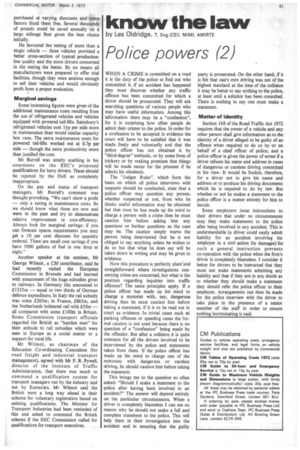Section 168 of the Road Traffic Act 1972 requires that
Page 53

If you've noticed an error in this article please click here to report it so we can fix it.
the owner of a vehicle and any other person shall give information as to the identity of a driver alleged to be guilty of an offence when required to do so by or on behalf of a chief officer of police; and a police officer is given the power of arrest if a driver refuses his name and address in cases of dangerous or careless driving committed in his view. It would be foolish, therefore, for a driver not to give his name and address or to produce his driving documents which he is required to do by law. But whether or not he makes a statement to the police offcer is a matter entirely for him to decide.
Some employers issue instructions to their drivers that under no circumstances may they make statements to the police after being involved in any accident. This is understandable (a driver could easily admit liability for an accident involving his employer in a civil action for damages) for such a general instruction prevents co-operation with the police when the firm's driver is completely blameless. I consider it better for drivers to be instructed that they must not make statements admitting any liability and that if they are in any doubt as to whether they should make a statement they should refer the police officer to their employer. Arrangements can then be made for the police interview with the driver to take place in the presence of a senior member of the staff in order to ensure nothing incriminating is said. Matter of identity




































































































